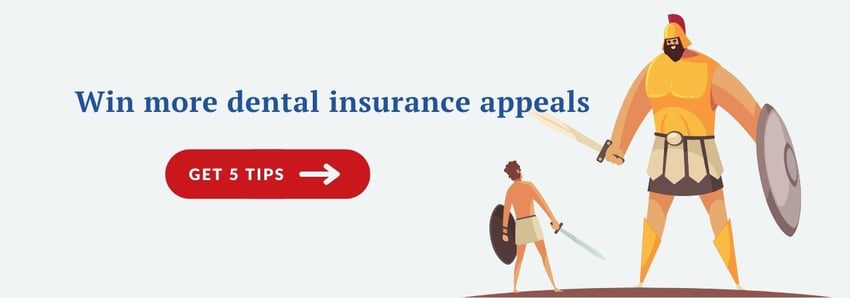3 problems predeterminations cause for your dental practice


Dental admin teams will sometimes file predeterminations to get a better idea of how much the patient will owe and what the insurance will cover for a procedure. It’s like a quote on how much the procedure costs and who will be paying for what. Here’s where the problem lies: this number isn’t always correct.
If you’re like me, you don’t like surprises and find joy in knowing what to expect. There’s nothing wrong with that, but when it comes to insurance billing, you have to always be prepared for things to not go as planned.
Predeterminations are something our billers at Dental ClaimSupport will help dental practices with if they ask, but we’ll be the first to tell you that they’re (in most cases) not worth your time or money.
In this article, you will learn how predeterminations are costing your dental practice time, money, and a pleasant patient experience.
They take away from the time needed to get actual claims paid, and can give inaccurate estimates of how much insurance and the patient should pay you. They can also give the patient an inaccurate estimation of how much they will owe, which will frustrate them.
What’s a predetermination?
Before we tell you the problems determinations can cause your dental practice, let’s nail down what it means.
A predetermination is a process where a dentist submits a treatment plan to the payer before treatment begins. The insurance company reviews the treatment plan and notifies the dentist and patient of one or more of the following: patient’s eligibility, covered services, amounts payable, co-payment and deductibles, and plan maximums.
Insurance verification gives you all of that same information we mentioned above, and it takes far less time. Why have the insurance company do this for you when you’ve technically already done it when you verified the patient’s insurance?
Now, here are the three big problems with predeterminations:
1. Predeterminations are time-consuming
A big reason why predeterminations aren’t productive is because of how much time they take.
Insurance billing is already time-consuming. Adding a predetermination to your process only makes more work for your team. You have to file the predetermination the same way you’d file a real insurance claim. So it literally adds extra steps to your process because you also have to wait to get the results.

This time could be spent working the aging report, appealing denied claims, and verifying insurance instead
Your time would be better spent performing tasks that increase your revenue such as working the aging report and following up on denied insurance claims.
Since a predetermination is not always an accurate number, who does it really help? While you were taking time to fill out the documentation required for a predetermination, you could be working the aging report, getting claims paid.
In a sense, it mainly helps insurance companies discourage you from filing claims. One dentist even called the process a “pre-denial.”
Your team could focus on verifying insurance benefits. This has far greater value than predeterminations. All of the information you get from predeterminations, you can also get from insurance verification.
Not to mention, spending time verifying insurance benefits can help you learn how to calculate out-of-pocket patient expenses yourself. But we’ll get more into that later.
2. Predeterminations are not always accurate
A big reason a predetermination isn’t a good use of your time is because it is typically not an accurate representation of how the treatment is going to be paid for. This could be due to claim denials, or even changes in procedure codes once the dental services are actually performed.
In fact, there is always a disclaimer on the predetermination that says this is not a guarantee of payment.
Predetermined estimates don’t prevent dental insurance claim denials
Not only could the numbers on the predetermination be inaccurate, but also your actual claim could still be denied. Taking this step to get a “preview” of what the treatment will cost insurance and the patient does not guarantee approval to pay your claim from insurance companies.
Because of this, it’s truly just taking up more of your time to work on this claim appeal after you already spent time trying to just get a preview of what the treatment is going to cost everyone.
The insurance could end up paying less than what the predetermination indicated, and the patient could end up paying more, which is another big problem for your office.
3. Predeterminations can frustrate your patients when they don’t match real costs
This is debatably the most important reason you should avoid predeterminations: you could annoy your patients.
When you send for a predetermination, your patient also receives a copy of the document saying how much the treatment might cost them. Emphasis on might.
Once they see this, because they don’t understand how insurance works the way dental professionals and billers do, they will assume this is the number they will prepare for when they come for treatment.
Predeterminations may even delay treatment acceptance. If your office is in the habit of getting predeterminations and telling your patients about it, they are less likely to schedule their treatment until the estimate comes back.
In some cases, insurance will take 30 to 45 days to get that back to you. All that time, you could have had that patient in their chair and their treatment completed and insurance claims paid.
If your patients get an unexpected bill, they could leave your dental practice
We all know good dental care isn’t cheap, even if you do have insurance. Not every patient has the resources to go to the office without considering how they should budget for the treatment they are about to have.
Learn the top 5 reasons patients will leave your practice in our Learning Center.
So, if this kind of patient is given a predetermination to inform them how much the treatment will cost, and how much their insurance will cover, they’re going to keep that number in mind. If you then bill them a different amount than this number, it can damage the trust they need to keep coming back. It gives them a reason to consider leaving your dental practice.
They will feel as though your practice misled them about how much a treatment costs and will find a new dental practice that they feel is more trustworthy.
If predeterminations cause all of these problems, why do billers perform this process?
If you wanted to put a positive spin on it, you could say that predeterminations help the patients understand their benefits more. It’s a great tool for providers and patients to understand the estimated out-of-pocket expenses as well.
But that’s the thing: the actual out-of-pocket expense is not always going to reflect the predetermined number once you submit a real insurance claim.
If you do get a predetermination, let the patient know that this is an estimation, not the exact number they will owe you
If spending time on a predetermination doesn’t take away from your other tasks, go for it! We do recommend that you communicate to your patient that this is an approximate number and that it could be different once an actual claim is filed.
Instead of waiting around for predeterminations, do your own dental insurance verification
Time is money, and you could likely get a more accurate estimation of how much a treatment will cost if you verify a patient’s insurance yourself. Their full breakdown will tell you everything you need to know about how much insurance is going to cover treatment.
Dental ClaimSupport can get predeterminations for you if you’re a client, but as we said - no billers recommend this. They’re unnecessary time wasters and could mislead the patient about how much their treatment might cost.
To learn more about how insurance verification is going to be the best route for getting a cost estimate and making your practice more money, read our article, “How insurance verification increases your dental practice’s revenue.”
Related Posts
Dental revenue resources from Dental Claim Support


